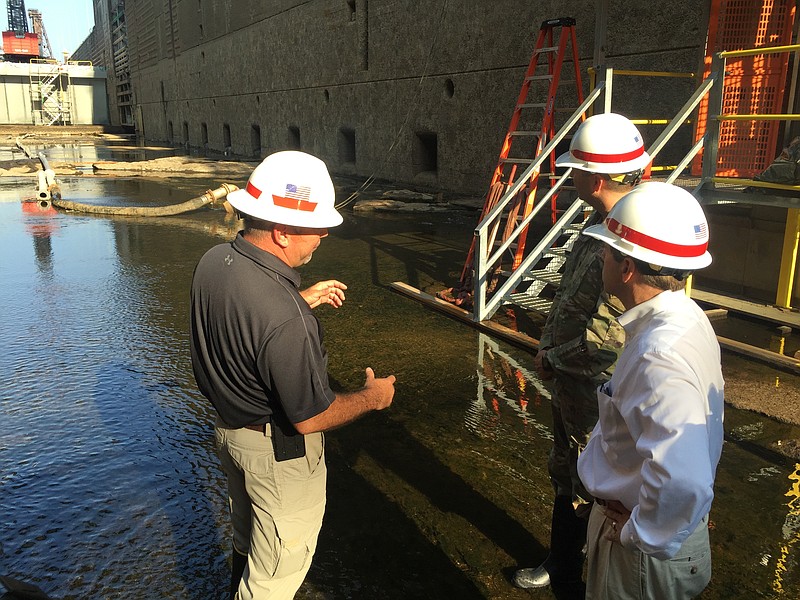U.S. Rep. Chuck Fleischmann said today "the future is very optimistic" for the completion of a new and bigger lock at the Chickamauga Dam in Chattanooga to replace the existing 76-year-old lock that continues to crack and suffer from concrete growth.
During a tour to the bottom of the existing lock chamber that was emptied of more than 10 million gallons of water three weeks ago, Fleischmann praised the Army Corps of Engineers for its repair efforts to keep the old lock open while he and others work to get funding for the new lock being built on the downriver side of the Chickamauga dam.
"This is an antiquated structure that must be replaced," Fleischmann said after reviewing the $1.3 million of maintenance and repair work being wrapped up this week by the Corps. "My commitment is steadfast. I have made this a legislative priority to make sure that the existing lock gets the funding it needs for maintenance and repair and that the new lock is very high on the priority list to make sure that money flows to get it built."
The Corps has brought a crew of 45 maintenance workers and engineers to Chattanooga to dewater and repair the existing lock this summer. The work work began July 11 and will leave the lock between the Nickajack and Chickamauga Reservoirs shut down until next Thursday.
The dewatering of the lock is part of the Corps' maintenance schedule to maintain and protect the locks that allow river barges to move up and down the 652-mile Tennessee River system. The Corps had a similar month-long maintenance outage at the Chickamauga lock four years ago, and has had to briefly suspend operations several times since due to severe weather or equipment problems.
During such work, river traffic is blocked from moving from downstream of Chattanooga to any of the navigable 318 miles above Chattanooga.
Col. Stephen Murphy, the head of the Nashville district for the Corps of Engineers, said the old lock is like "a sick patient" that must be nurtured.
"We have a great crew from across America that is doing yeoman's work to keep this open," he said.
The funds to maintain the existing lock are in a separate fund are robust and they are there. The money for the new lock is in a different fund, which we have restructured to make sure we have funds flowing for that work."
The new lock is getting nearly $30 million of funds in the current fiscal year, up from a mere $3 million last year, to help pay for the removal of 98,000 cubic yards of rock from the riverbed below the Chickamauga Dam where the new 110-foot by 600-foot lock will be built. The Corps has spent more than $185 million so far on the new lock, but it is projected to cost more than $500 million more to be completed in the next seven years - and then only if adequate funds are provided each year.
Murphy said the new lock could be finished by 2023 "with sufficient funding."
Fleischmann said more money will be needed as the project moves forward, but he said more funds should be available as the top priority locks on the Ohio River at the Olmsted Lock, on the Mongahela River near Pittsburg and at the Kentucky Lock downstream on the Tennessee River are completed in the next few years. Fleischmann also was among those who helped support a higher barge fuel tax to provide more funds for inland waterway projects.
"Over time based on the formula we have set up as these other projects are finished ( more money will come to the Chickamauga Lock to keep us on track to complete the new lock," Fleischmann said. "The key will be to make sure that the projects that have a higher priority and require greater amounts of funding get completed - and they are being completed."
Fleischmann said he is hopeful that the new Chickamauga Lock will get about $37 million of additional federal funding in fiscal 2017, although Congress has yet to adopt a final version of the energy and water appropriations bill.

